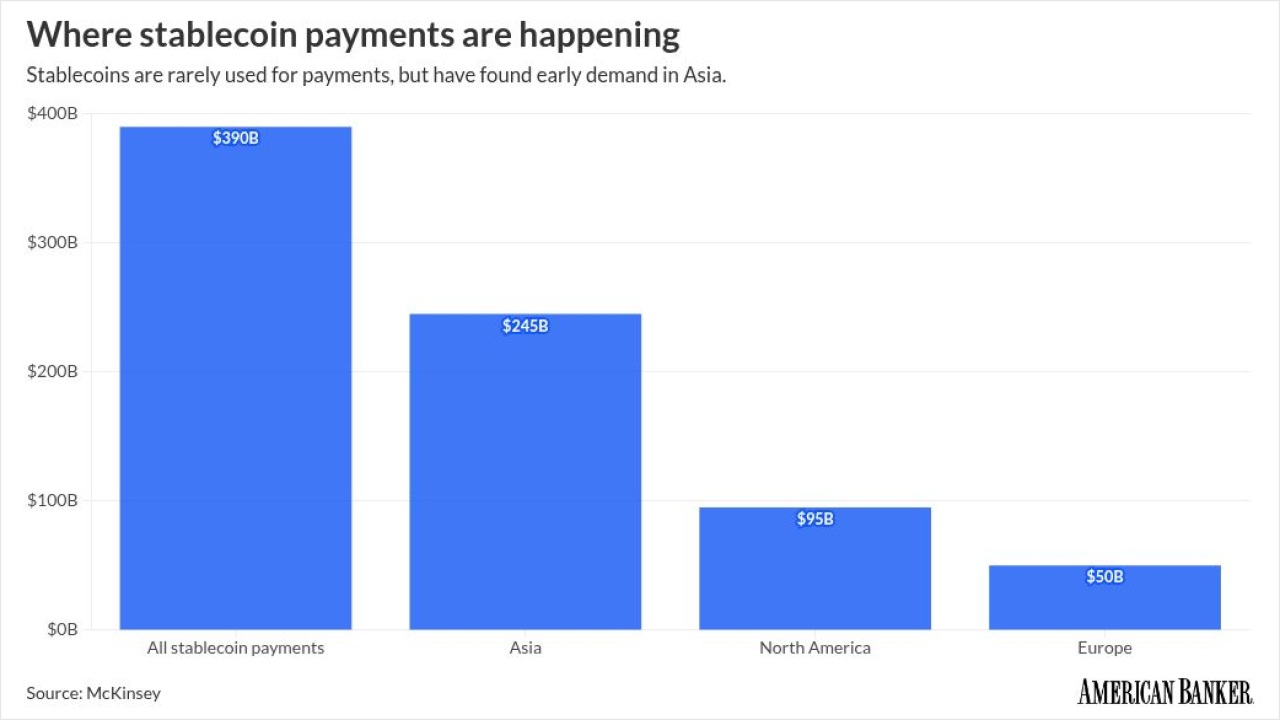
Early Warning Services' digital wallet Paze took a few extra months to design, so a planned summer pilot of the card-based online checkout process won't begin until next month. But initial tests of the bank consortium-owned wallet have revealed some surprises.
"As we get ready to go live with the pilot for Paze, we're discovering some interesting hybrid use cases we didn't anticipate with certain merchants, including restaurants," said James Anderson, who heads Paze for EWS, which launched
Paze will test its consumer appeal beginning in October in a pilot confined to a single, undisclosed U.S. state. Multiple banks will come together within the wallet to be used by a large cross section of employees from the seven large banks that own EWA. These were the same institutions to first test Zelle before it launched in 2017 — Bank of America, Capital One Financial, JPMorgan Chase, PNC Financial Services Group, Truist Financial, U.S. Bancorp and Wells Fargo.
"Brick-and-mortar places that used to have a completely point-of-sale card-payment experience increasingly are hybrid, with an online option that makes Paze accessible there, too," Anderson said.
Online purchases of digital services and subscriptions are also emerging as a strong use case for Paze, as these categories experience more fraud and
Overall, Paze has a long road ahead to gain broad adoption. The biggest hurdle will be getting enough merchants on board for Paze to get consumers' attention and build scale.
So far only a single merchant, Omaha Steaks, has been announced, although Anderson said several other large merchants have committed to the concept.
Until a significant number of prominent merchants appear, Paze's future will be cloudy, said Thad Peterson, a strategic advisor with Datos Insights.
"A wallet is a two-sided platform, and without merchants there isn't a lot of value for consumers. Paze needs to get a critical mass of accepting merchants to make it succeed," he said.
Anderson promises that more merchant deals are in the pipeline and Paze also is finalizing agreements with large e-commerce platforms that will bring on smaller merchants en masse.
"We've signed agreements that will bring us tens of thousands of merchants at a go — [they're] payment facilitators and entities that have relationships with many merchants," Anderson said, declining to name any specific providers.
Paze aims to simplify and secure checkout by tokenizing credit and debit card numbers so users never have to enter card data, usernames or passwords. But the experience isn't friction-free. Users must enter a one-time password sent by text to confirm every purchase.
"Consumers say they care about security, but convenience most often wins, and this is particularly true since most financial institutions cover any potential fraud losses, so the customer is off the hook," Peterson said.
Any friction, including extra security steps, is likely to hurt consumer adoption and usage, he said.
Anderson doesn't believe the requirement will irritate many Paze users.
"It's quite common now for consumers to experience two-factor authentication for many mobile device operations, and we found that consumers actually prefer that model to usernames and passwords," he said.
After the pilot, which may last several months, Paze will expand access to all U.S. states and invite banks of all sizes to participate. Through a pending agreement with a third party, Paze expects to sign about 1,000 financial institutions at once, according to Anderson.
As more banks sign on, consumers will be able to toggle between preferred cards from competing institutions within Paze with ease, he said.
Paze has been testing the wallet with a small group of users, but setting up a formal pilot in a region where all seven EWS-owner banks had a presence —originally planned for summer 2023 — was more time-consuming than expected, Anderson said.
"Then we found ourselves getting close to the holiday season, when a lot of institutions put tech upgrades on hold, and we decided to do a more phased rollout and gain more confidence before a wider rollout in the first quarter of next year," he said.
In the most optimistic view, Paze may repeat the success of Zelle by using the collaborative power of some of the largest banks to create a product that increases participating banks' transaction volume and builds tighter relationships with consumers.
But the intense competition at the checkout from rival wallets ranging from Apple Pay to Google's GPay to PayPal — along with multiple buy now/pay later checkout options — could make consumer adoption more challenging.
"There are a lot of solid competitive alternatives in-market already, and Paze needs to be as good or better than them to succeed," said Datos Insights' Peterson.












